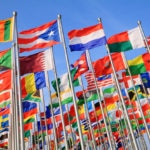Towards full banking penetration?
Between 2011 and 2014, 700 million people opened a bank account. In the same period, the number of people outside the banking system fell by 20%, or 2 billion adults. In 2014, 62% of adults held an account, well above the 54% registered in 2011.

The World Bank's 2014 Global Findex study, funded by the Bill and Melinda Gates Foundation in partnership with Gallup, Inc., highlights the importance of banking penetration for a country's development: “It is a critical factor in reducing poverty and is the result of economic growth. It is not an end in itself, but it leads us towards an end since it offers substantial benefits for individuals”.
The year 2020 is one of the dates set by the World Bank for many countries in Latin America to achieve full banking penetration. Meanwhile, governments are implementing programs to put an end to the so-called “financial illiteracy” of the population. This report stresses that to the extent that “people participate in the financial system, they are better prepared to run their businesses, invest in education or face risks”.
Pedro Ramiro, coordinator of the Latin American Multinational Company Observatory (OMAL), points out in this article published in El País the possibilities that banking penetration offers to financial institutions: “Workers are paid in an envelope, families do not use standing orders, or mortgages… there is a huge potentiality for customers”.

Turning to the report, Global Findex shows that Latin America and the Caribbean have made significant progress in banking penetration. 51% of adults (over the age of 15) in Latin America and the Caribbean hold an account, compared with 39% in 2011, but even though this progress is significant, there are still 210 million adults outside the banking system. These account for 10% of the total 2 billion people who are still not using financial services worldwide.
Today, 40 million adults receive government payments in accounts. In Brazil, 88% of the beneficiaries of government transfers received them in an account. In Argentina, the number of account holders among the poorest 40% of households doubled to 44% between 2011 and 2014.
In Mexico, the percentage of the adult population with an account increased from 27.4% in 2011 to 31.1% in 2014, a level well below countries like Brazil (68.1% of adults with an account), Chile (63.3%), Venezuela (57%), Ecuador (46.2%), Uruguay (45.6%), Panama (43.7%), Bolivia (41.8%) and Guatemala (41.3%).
The most notable change in access to financial services in the region comes from Central America: in El Salvador, Guatemala, Panama and Honduras the number of account holders increased by more than 50% between 2011 and 2014. Lagging behind are Peru (with only 29% of adults with an account), Nicaragua (19%) and Haiti (18%).
In the region as a whole, 28% of adults make payments directly against their accounts using a debit card, compared with 14% in developing countries on average.
The role of governments and private institutions in banking penetration
These figures show that there is still a long way to go in promoting the use of banking: 135 million adults hold an account, but they pay for their utility bills in cash. The report says: “By paying wages in the public sector and government wages and transfers in digital format (instead of in cash), governments and the private sector can play a key role in accelerating the opening of accounts and boosting financial inclusion. Worldwide, payment of government wages and transfers through accounts could increase to 160 million the number of adults holding an account”.
The report also addresses another important part of banking penetration: saving. However, holding a checking account does not guarantee that people will save money at a financial institution.
Of the 41% of people who claimed to have saved in 2014, more than half did not to so through financial and similar institutions, although compared with 2011 there was a 13% increase in those who saved using bank branches.
When asked why they do not hold an account, their answer is that they are very expensive and they believe that they have no need to hold an account. The report highlights that the moment “costs go down, many people will be willing to hold an account”.
Full banking penetration is one of the most effective instruments in fighting poverty.